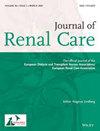Evaluating the feasibility and acceptability of home-based urinalysis for albumin-creatinine ratio with smartphone technology: A quality improvement project
Abstract
Background
Despite albumin-creatinine ratio (urine) testing being recommended for detection of chronic kidney disease among adults with diabetes, testing rates are suboptimal.
Aim
We implemented and evaluated a quality improvement project in an inner-city diabetes population in London, UK to assess the feasibility and acceptability of implementing novel home-based urinalysis using smartphone technology.
Methods
After eligible patients were identified and consented, testing kits were sent to the patient's home. Test results and patient feedback were collected through the smartphone application. Focus group discussions were conducted to evaluate primary care staff perspectives on uptake and delivery of the service.
Results
In total 2370 patients agreed to take part. Of these, 1244 completed the test (61% of those eligible) and of these, 465 (37%) had clinically significant albuminuria. 98% of patients found the test easy or very easy to use. Staff in primary care found the service to be beneficial for patients, and reported ease of set up and minimal administrative processes. Concerns regarding barriers among patients with lower digital literacy and non-English speakers were raised although these concerns were not substantiated.
Conclusion
Home-based albumin-creatinine ratio urine testing may improve the testing rates of people with diabetes at higher risk of chronic kidney disease. This is important post-pandemic, as healthcare services are trying to return to pre-pandemic levels of care. The study also found that the use of smartphone technology in an underserved (deprived) community is feasible, despite reservations about levels of digital literacy and possible language barriers. Further evaluation of effectiveness and costs is required.


 求助内容:
求助内容: 应助结果提醒方式:
应助结果提醒方式:


